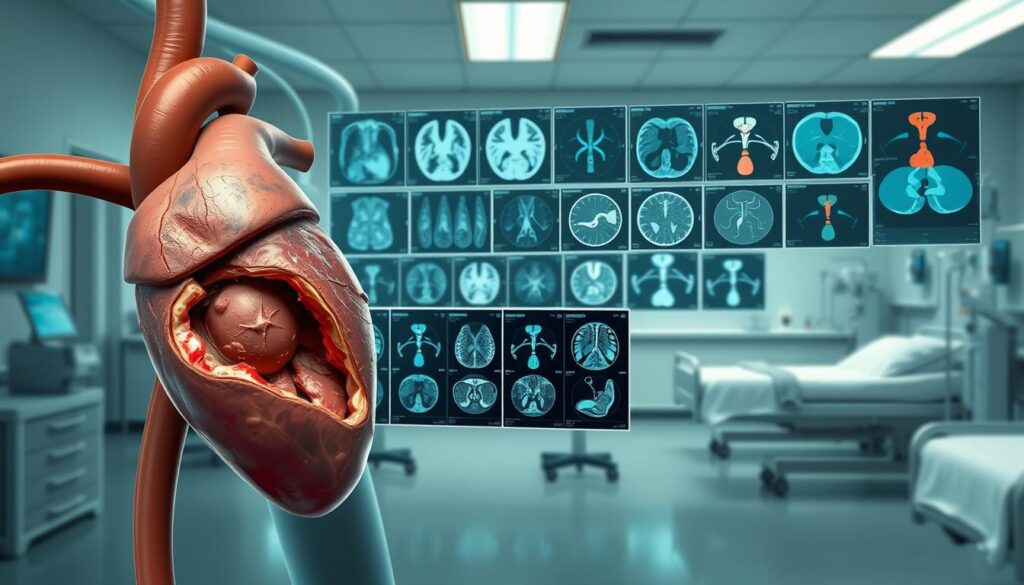As I went through my pregnancy, I learned how important it is to know about health complications. Knowing the basics of pregnancy, like nutrition and the different trimesters, helps mothers take care of themselves.
Getting regular prenatal care is key to spotting and handling any issues early. Knowing the risks in each trimester helped me make better choices for my health. This way, I could avoid or lessen any potential complications.
Key Takeaways
- Prenatal care is crucial in managing health complications
- Nutrition plays a vital role in a healthy pregnancy
- Understanding trimester details can help expectant mothers prepare for potential risks
- Being informed about potential complications can help reduce anxiety
- A proactive approach to health can lead to a healthier pregnancy
Understanding Complications in Health
To tackle health complications, we must first grasp what they are. These issues can greatly affect how a disease or treatment ends. Knowing about them is key to managing them well.
Definition of Complications
A complication is when something extra happens during a disease or treatment. It’s not caused by the disease or treatment itself. Medical complications can come from many sources, like how a disease gets worse, how the body reacts to treatment, or outside factors.
“Complications are unwanted outcomes that can often be more challenging to manage than the initial condition,” say healthcare experts.
Types of Complications
Complications can be grouped based on their nature and causes. Here are some common ones:
- Surgical complications, which can happen during or after surgery
- Infections as complications, which can come from a disease or treatment
- Chronic disease complications, which develop over time due to ongoing health issues
Knowing these types helps us spot risks and prevent them.
Why Complications Occur
Complications happen for many reasons. These include how severe the initial condition is, how well the treatment works, and factors like age, health, and lifestyle. Understanding the reasons behind complications is essential for finding ways to lessen their effects.
By knowing why complications happen, healthcare teams can act early. This helps reduce their occurrence and better patient results.
Common Medical Complications
It’s key to know about common medical issues for good health care. These problems can really affect how well a patient does. So, it’s important to spot and handle them quickly.

Surgical Complications
Surgical problems, like postoperative complications, are big worries in health care. They can happen for many reasons, like how complex the surgery is, the patient’s health, and following care instructions after surgery. To manage these issues well, you need a detailed plan, including good wound care and watching for infection signs.
Some usual surgical complications are infections, bleeding, and bad reactions to anesthesia. Knowing these risks helps doctors prevent them and deal with them if they happen.
Infections as Complications
Infections are a big problem in medical settings, hurting patients’ health and recovery. Infections as complications can come from many places, like surgery sites, medical devices, and hospital infections. It’s very important to use infection control steps, like washing hands well and making sure things are clean.
Spotting infection signs early is crucial for managing them well. Signs include fever, redness, swelling, and pain. Quick treatment with antibiotics or other steps can lessen the harm of infections on patients.
Chronic Disease Complications
Chronic diseases, like diabetes and heart disease, can cause big problems if not managed right. Chronic disease complications can include heart attacks, kidney damage, and vision loss. To manage chronic diseases well, you need to make lifestyle changes, take your medicine, and get regular check-ups.
Knowing the possible problems from chronic diseases helps people take steps to manage their condition better. This means eating well, staying active, and going to regular doctor visits.
Risk Factors for Developing Complications
Several factors can increase the risk of complications. These include age, health status, and lifestyle choices. Some people are more likely to face complications due to their health and life situation.
Age and Health Status
Age is a big risk factor for complications. As we get older, our bodies change, affecting our health. Older adults often have weaker immune systems, making them more likely to get sick.
People with health issues like diabetes or heart disease also face higher risks. These conditions can lead to more serious problems.
Lifestyle Choices
Lifestyle choices greatly impact the risk of complications. Bad habits, like smoking, poor diet, and not exercising, raise this risk. Smoking can harm the lungs, and a diet full of processed foods and sugar can lead to chronic diseases.
Healthy habits, however, can lower this risk. Regular exercise, a balanced diet, and avoiding harmful substances are key. These actions help keep you healthy and well.
Genetic Predisposition
Genetics also play a role in the risk of complications. Some genetic conditions raise the risk of certain health problems. It’s important for those with a family history of these conditions to know their risk.
Understanding genetic predisposition helps manage health and lower complication risks. Working with healthcare providers to create a personalized health plan is crucial.
The Importance of Early Detection
Early detection and timely action are key to managing complications. Spotting complications early helps get the right treatment fast. This reduces the risk of serious problems. It’s all about catching the signs and symptoms early.

Signs of Complications
Spotting the signs of complications is crucial for early detection. Common complications show up in different ways, like:
- Persistent pain or discomfort
- Unexplained fever or infection
- Changes in physical condition or function
- Unexpected weight loss or gain
Knowing these signs helps people get medical help quickly. This boosts their chances of managing complications effectively.
Screening Recommendations
Regular screening is key for catching medical complications early. Doctors suggest different tests based on your health, age, and risk factors. Some common tests include:
- Annual check-ups for chronic disease management
- Screening tests for diabetes and cardiovascular diseases
- Cancer screening tests as recommended by healthcare guidelines
Following these screening tips can lower the risk of serious health issues. It’s important to work with your doctor to find the right screening schedule for you.
In summary, catching complications early is vital for managing them well. By recognizing signs and following screening advice, people can stay healthy and avoid serious problems.
Managing Medical Complications
Managing health complications needs a team effort. This includes healthcare providers and patients working together. Understanding how to handle complications helps us face challenges better.
Treatment Options
Treatment options are key in managing medical issues. These can be medicines, surgery, lifestyle changes, or alternative therapies. The right treatment depends on the complication, the patient’s health, and their wishes.
For example, if there’s a surgical problem, more surgery might be needed. For chronic disease complications, a mix of medicine and lifestyle changes might work.
Role of Healthcare Providers
Healthcare providers are crucial in managing complications. They diagnose, suggest treatment plans, and watch how the patient is doing. Their knowledge and advice are very important.
They also teach patients about their conditions and how to manage them. This helps patients take charge of their health.
Patient Responsibility
While healthcare providers are essential, patient responsibility is also vital. Patients must follow their treatment plans, make lifestyle changes, and talk to their healthcare providers. This way, they can improve their health and avoid more problems.
Being involved in their care helps patients get better results. It’s a team effort that needs commitment from both patients and healthcare providers.
Complications in Pregnancy
It’s important for expectant mothers to know about potential pregnancy complications. Pregnancy is a complex process. Many factors can lead to complications that affect both the mother and the baby.
Potential Risks for Mother and Baby
Pregnancy complications can be serious. They include gestational diabetes and high blood pressure. These can cause preterm labor, low birth weight, and other issues.
Expectant mothers should know about these risks. They should take steps to prevent them. Regular prenatal care is key to spotting complications early.
Common Pregnancy Complications
Some common pregnancy complications are:
- Gestational diabetes
- Hypertension (high blood pressure)
- Preterm labor
- Preeclampsia
These can be managed with the right medical care and lifestyle changes.
Preventive Measures
Preventive measures are crucial in reducing pregnancy complications. Eating a healthy diet, staying hydrated, and exercising regularly can help.
Also, regular prenatal check-ups are important. They let healthcare providers monitor the pregnancy and address any issues quickly.
By staying informed and proactive, expectant mothers can lower their risk of pregnancy complications.
Complications from Medications
Medications are key in treating many health issues. Yet, they can sometimes cause unexpected problems. It’s vital to know the risks tied to their use.
Adverse Drug Reactions
Adverse drug reactions (ADRs) are harmful effects from taking medications. These can be mild, like nausea, or severe and life-threatening.
It’s crucial to spot ADRs early. Patients should watch for side effects and tell their doctors about any unusual symptoms.
Drug Interactions
Drug interactions happen when one medication affects another. This can make one or both drugs less effective or increase risks of side effects.
Knowing about drug interactions is essential for safe use. Patients should tell their doctors about all medications, vitamins, and supplements they take to avoid interactions.
Importance of Medication Management
Good medication management is key to avoiding drug complications. It involves doctors prescribing correctly and patients following their medication plans.
As the saying goes, “Knowledge is power.” Knowing about your medications can greatly lower complication risks. A quote from the
National Institute on Aging
underscores the need for medication management: “Taking medications correctly is crucial for achieving the desired therapeutic effect and minimizing the risk of adverse effects.”
By understanding and managing medication risks, people can get the most from their treatments while avoiding dangers.
Mental Health Complications
Mental health is very important in our lives. Issues like anxiety and depression can really hurt us. They can change how we feel, who we interact with, and our overall happiness.
Anxiety and Depression
Anxiety and depression are big problems. Anxiety makes you worry too much and feel scared. Depression makes you feel sad all the time and lose interest in things you used to like.
Many things can cause these problems. It could be your genes, what happens in your life, or where you live. Knowing what causes them and spotting the signs is key to dealing with them.
Impact on Physical Health
Mental health issues can hurt your body too. For example, too much anxiety can lead to heart problems, stomach issues, and a weak immune system. Depression can cause changes in appetite, trouble sleeping, and feeling very tired.
Seeking Help and Support
Getting help is very important for mental health. You might talk to a therapist or counselor. They can help you find the right treatment, like therapy or medicine.
Having support from loved ones and groups is also very helpful. By understanding the value of mental health and taking action, you can improve your health.
Ignoring mental health problems can lead to bigger issues. These can make it hard to do everyday things and lower your quality of life. So, it’s important to know the risks and take steps to avoid them.
Lifestyle Changes to Prevent Complications
Preventing complications needs a mix of diet, exercise, and stress control. A healthier lifestyle can greatly lower the risk of health issues.
Nutrition and Diet
Eating well is key to staying healthy and avoiding complications. Eating a variety of foods like fruits, veggies, whole grains, lean proteins, and healthy fats helps your body. It also lowers the chance of getting chronic diseases.
Nutritional Tips:
- Drink lots of water to stay hydrated
- Eat less of processed and sugary foods
- Add fiber-rich foods for better digestion
Exercise and Physical Activity
Regular exercise is vital for both body and mind. It helps with weight control, heart health, and lowers the risk of diseases like diabetes and some cancers.
Recommended Activities:
- Try aerobic exercises like walking, cycling, or swimming
- Do resistance training to build muscle and strengthen bones
- Do flexibility exercises like yoga or Pilates for better flexibility and balance
Stress Management
Managing stress well is important for your overall health. It helps avoid mental health issues. Methods like meditation, deep breathing, and mindfulness can lower stress and boost resilience.
Stress Management Techniques:
- Try mindfulness meditation every day
- Do physical activities to release happy hormones
- Stay connected with friends, family, or support groups for a strong social network
By making these lifestyle changes, you can actively prevent complications and keep your health in check.
The Role of Support Systems
Managing health issues can be tough, but a strong support system helps a lot. It offers emotional, physical, and sometimes financial help. This makes it easier for people to deal with their health problems.
Family and Friends
Family and friends are usually the first to help those with health issues. They provide emotional support, help with daily tasks, and go to doctor’s appointments with them. Their support is key to keeping a patient’s mental and emotional health strong.
Support Groups
Support groups are for people facing similar health problems. They share experiences, advice, and encouragement. Being part of a group makes people feel less alone and more able to handle their health.
You can find support groups in your area, online, or through healthcare providers. They offer a place to talk about challenges and successes. This builds a sense of community and understanding.
Professional Help
Healthcare providers, therapists, and counselors are vital in managing health issues. They give expert advice, treatment options, and emotional support. This support is tailored to each person’s needs.
Having professional help makes a big difference. It ensures people get the care and guidance they need. This helps them manage their health challenges better.
| Support System | Benefits | Examples |
|---|---|---|
| Family and Friends | Emotional support, practical help | Helping with daily chores, emotional encouragement |
| Support Groups | Shared experiences, community | Online forums, local support groups |
| Professional Help | Expert advice, tailored support | Healthcare providers, therapists, counselors |
In conclusion, a good support system is key to managing health issues well. With the help of family, friends, support groups, and professionals, people can handle their health challenges better. This improves their overall well-being.
Conclusion: Staying Informed About Complications
Knowing about health complications is key to staying healthy. It helps people take steps to avoid them.
Open Communication with Healthcare Providers
Talking openly with doctors is important. It helps understand risks and find ways to avoid them.
Proactive Health Management
Being proactive means knowing about potential problems. It’s about working with doctors to stay healthy. This includes eating well and exercising regularly.
By staying informed and working with doctors, people can lower their risk of health issues. This helps keep them in top shape.
FAQ
What are some common medical complications that can arise during pregnancy?
Common issues during pregnancy include gestational diabetes, high blood pressure, and preterm labor. Knowing these risks helps expectant mothers stay healthy.
How can I prevent complications during pregnancy?
To prevent issues, eat well, drink plenty of water, and go to prenatal check-ups. These steps can lower the risk of problems.
What are the risks associated with surgical complications?
Risks from surgery include infection, bleeding, and bad reactions to anesthesia. Knowing these can help you make better choices about your care.
How can I manage chronic disease complications?
Managing chronic diseases needs a full plan. This includes taking medicine, making lifestyle changes, and regular check-ups. A healthcare provider can help create this plan.
What is the importance of early detection in managing complications?
Finding problems early is key to managing them well. Screening and spotting signs early can lead to timely treatment and lower risks.
How can I reduce my risk of developing complications from medications?
Knowing the risks of medicines, like bad reactions and interactions, can help you avoid them. Always talk to your healthcare provider about your meds.
What lifestyle changes can I make to prevent complications?
Healthy choices like a balanced diet, exercise, and managing stress can prevent complications. These habits also boost your overall health.
How can support systems help in managing complications?
A strong support network, like family and friends, can help with complications. Professional help, like counseling, can also be very helpful.
What is the role of healthcare providers in managing complications?
Healthcare providers are vital in managing complications. They diagnose, treat, recommend tests, and guide lifestyle changes.
How can I stay informed about complications and take a proactive approach to my health?
To stay informed and proactive, understand risks, make healthy choices, and work with healthcare providers. This keeps you healthy.

